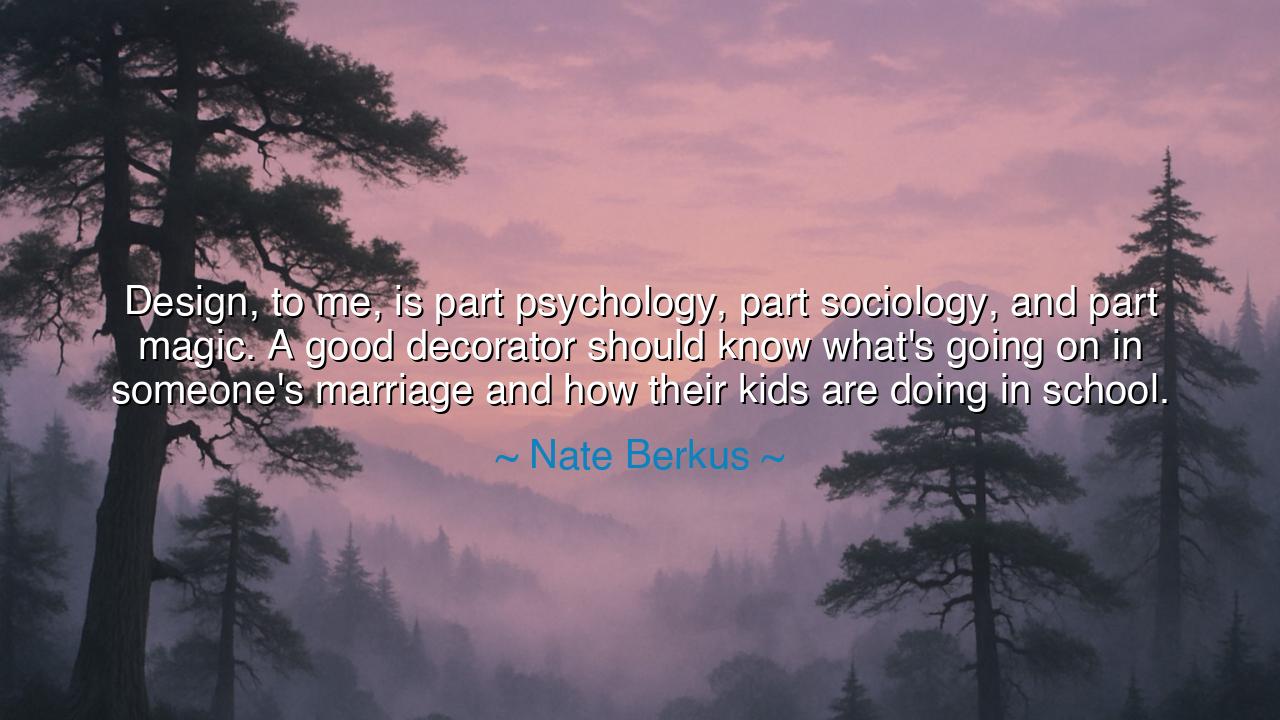
Design, to me, is part psychology, part sociology, and part
Design, to me, is part psychology, part sociology, and part magic. A good decorator should know what's going on in someone's marriage and how their kids are doing in school.






In the profound and poetic words of Nate Berkus, the declaration — “Design, to me, is part psychology, part sociology, and part magic. A good decorator should know what's going on in someone's marriage and how their kids are doing in school.” — speaks not merely of the craft of interior design, but of the deeper art of understanding the human spirit. For Berkus, design is not the mere arrangement of furniture or the selection of color; it is the creation of harmony within a person’s most sacred space — their home. His words remind us that the truest beauty is not made with materials alone, but born from empathy, intuition, and love.
The meaning of this quote reaches into the essence of human-centered creation. To say that design is “part psychology” is to recognize that every home is a reflection of the inner life of those who dwell within it. The designer must see not only the walls and windows, but the emotional architecture of the people who live there — their fears, their hopes, their longing for comfort or renewal. When Berkus speaks of “part sociology,” he acknowledges that design is also about connection — how people interact with one another, how families grow together or apart, and how spaces can nurture or harm those relationships. And then, when he says it is “part magic,” he points to the mysterious alchemy that happens when all these invisible threads come together to create something that feels alive, timeless, and whole.
The origin of these words lies in Berkus’s lifelong calling — not simply as a designer of homes, but as a healer of spaces and spirits. Through his work, whether in private homes or on the public stage, he has sought to restore meaning and beauty to the places people inhabit. He understands, as the ancients did, that the home is not a shelter of wood and stone, but a mirror of the soul. If the home is chaotic, so too is the heart; if it is cold and impersonal, the spirit grows weary. Thus, his philosophy of design is also a philosophy of life: that every act of creation must begin with compassion — with seeing the world through another’s eyes and shaping it to support their well-being.
Consider the story of the great architect Frank Lloyd Wright, who believed that a building must grow from its environment “as naturally as a tree grows from the soil.” When he designed a home, he did not impose beauty upon it; he listened to the land, to the family, to the rhythm of life that would dwell within its walls. His masterpiece, Fallingwater, was born from this harmony — the merging of nature, structure, and spirit. Wright, like Berkus, understood that design without empathy is lifeless, and that the magic of creation emerges only when one honors the living relationship between space and soul.
But Berkus goes even further, urging designers to understand the intimacies of life itself — “what’s going on in someone’s marriage” or “how their kids are doing in school.” This is not mere curiosity; it is an act of deep care. For how can one create peace in a home without understanding the hearts that beat within it? A space designed for a family burdened by stress must invite calm and unity. A home for one recovering from loss must offer warmth and renewal. Thus, the designer becomes part artist, part counselor, part philosopher — shaping not only rooms but also the atmosphere of living. This is the sacred task of creation: to make beauty that heals.
The wisdom in Berkus’s words also extends beyond design itself. It speaks to anyone who seeks to create — whether one builds homes, relationships, or ideas. To create well, one must understand the people for whom the creation is made. One must listen before acting, feel before shaping, and see before judging. The great teacher Confucius once said, “The craftsman who wishes to do his work well must first sharpen his tools.” For Berkus, those tools are not hammers and paintbrushes, but empathy, patience, and perception — the inner tools that allow the artist to serve something larger than themselves.
Let this, then, be the lesson: creation is not mastery over things, but harmony with people. Whether you design a home, lead a community, or raise a family, strive first to understand the hearts of those around you. Learn their stories, their struggles, and their joys, and let that knowledge shape your work. In doing so, your efforts will transcend skill — they will become acts of love, infused with the same quiet magic that Berkus speaks of. For only when creation flows from compassion does it become timeless.
And so, my listener, remember the wisdom of Nate Berkus: “Design is part psychology, part sociology, and part magic.” Whatever your craft may be, practice it not with detachment, but with presence. Look deeply into the lives your work will touch, for in understanding them, you will unlock the true art of creation. Then, your work — whether in rooms, words, or deeds — will not merely exist; it will breathe. It will comfort. It will endure. For the greatest beauty in any design is not what the eye beholds, but what the heart feels.






AAdministratorAdministrator
Welcome, honored guests. Please leave a comment, we will respond soon